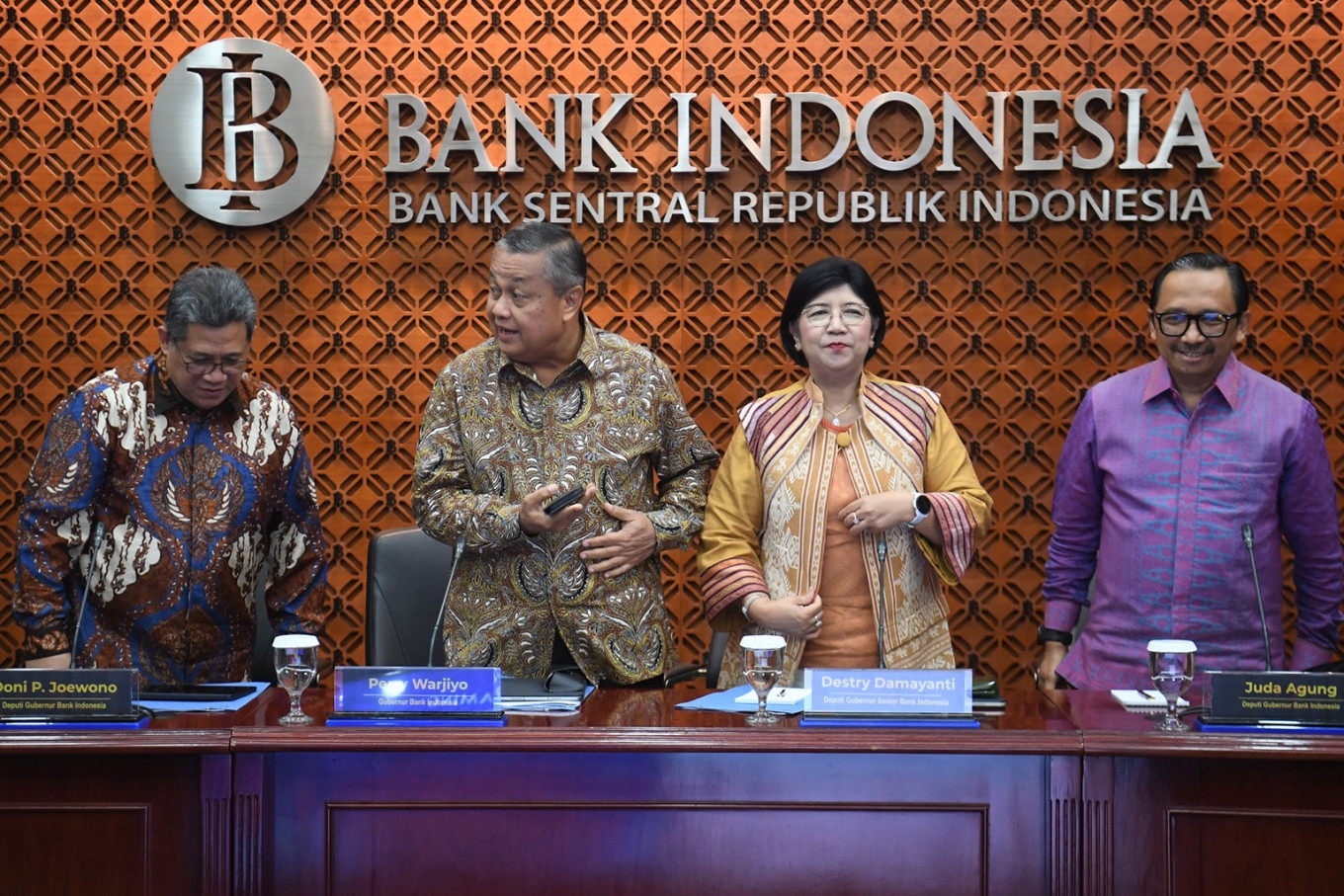Popular Reads
Top Results
Can't find what you're looking for?
View all search resultsPopular Reads
Top Results
Can't find what you're looking for?
View all search resultsBI sees Fed rate cut only in November, projects own cut in Q4
Bank Indonesia (BI) expects the United States’ central bank to start reducing its key interest rates in November and sees its own BI Rate also coming down in the fourth quarter.
Change text size
Gift Premium Articles
to Anyone
 Bank Indonesia Governor Perry Warjiyo (second left), accompanied by senior deputy governor Destry Damayanti (second right) and deputy governors Doni Primanto Joewono (left) and Juda Agung (right), prepares for a press briefing in Jakarta on June 20, 2024, to present the results of the central bank's board of governors meeting. (Antara/Akbar Nugroho Gumay)
Bank Indonesia Governor Perry Warjiyo (second left), accompanied by senior deputy governor Destry Damayanti (second right) and deputy governors Doni Primanto Joewono (left) and Juda Agung (right), prepares for a press briefing in Jakarta on June 20, 2024, to present the results of the central bank's board of governors meeting. (Antara/Akbar Nugroho Gumay)
B
ank Indonesia (BI) expects the United States’ Federal Reserve to start reducing its benchmark interest rates in November and projects a cut of its own BI Rate also in the fourth quarter.
Following the central bank’s monthly policy meeting in Jakarta, BI Governor Perry Warjiyo revealed on Wednesday that the monetary policy authority had revised its estimate for a federal funds rate (FFR) cut to November from its initial prediction of December.
“As for the FFR, which we initially thought would only start coming down in December, based on the latest data we have there is a greater probability of [the cut] getting brought forward to November,” Perry said during the press briefing.
That projection is misaligned with overall market expectations. According to the CME FedWatch tool, interest rate traders see a 93-percent chance of a 25-basis-point cut in September. Until then, the Fed is deemed likely to keep its FFR target range steady at 5.25 to 5.5 percent.
Fed Chairman Jerome Powell signaled on Monday that the Fed need not wait for US inflation to come down to 2 percent before undertaking its first cut in the current cycle.
Powell said the three latest inflation readings over the second quarter of this year “add somewhat to confidence” that the pace of inflation is returning to the Fed’s target, Reuters reported on Monday.
Speaking in front of the US Congress last week, Powell said the US economy was “no longer overheating”, since the labor market was looking like it was “back in balance”.
Market participants interpreted Powell’s remarks as strengthening the case for interest rate cuts in September.
However, BI’s Perry suggested the market typically exhibited a bias toward "sooner" rather than later interest rate cuts.
“We do not yet dare say that [the FFR cut] will be pushed forward to September, even though the market is saying it’s September. Our latest estimates point to a probability of the FFR going down in November,” Perry said.
Nevertheless, an earlier cut would entail the probability of the rupiah strengthening “or at least becoming more stable” against the US dollar, the governor said.
On top of inflation readings, BI pays attention to the rupiah’s exchange rate in its monetary policymaking because of the risk of currency devaluation contributing to imported inflation.
In the briefing, Perry announced that BI was keeping the benchmark interest rate at 6.25 percent, where it has been since April.
Read also: BI hikes interest rates to mitigate external risks
Perry revealed his expectation that BI would undertake its own cut in the fourth quarter. The possible magnitude of such a move was “data-dependent”, he said, referring to US Treasury yields, the FFR and the rupiah’s exchange rate.
Bank Permata chief economist Josua Pardede wrote in an analysis released on Wednesday that the private lender expected BI to maintain its benchmark interest rate at the current level until the end of 2024 and that a cut might only emerge in the first quarter of next year.
Read also: Gold price hits record high on rate cut expectations
He argued that BI would only get an opportunity to cut its rate once the Fed reduced the FFR.
“We believe that the Fed will adopt a patient and data-driven approach, taking into account broader aspects of the US economy, including the implications of domestic political dynamics amid this year's election,” said Josua, who predicts just one FFR cut this year.
Similarly, Bank Danamon economist Hosianna Evalita Situmorang said in an analysis released on Wednesday that BI would only start its cutting cycle in the first quarter of 2025.
“While there is room for BI to consider lowering interest rates, the central bank will proceed with caution due to global conditions,” reads Hosianna’s analysis.
The US election had pushed short-term Treasury yields higher, she explained. That could place Indonesia’s bonds at a disadvantage, since investors might flock to the dollar and weaken the rupiah’s exchange value in the process.
“BI's strategy in the short term is directed at strengthening the effectiveness of stabilizing the rupiah exchange rate and attracting foreign capital inflows,” Hosianna said.
Perry said the yield of two-year US Treasury notes was now higher than the 10-year Treasury yield, and the two would only begin to converge in the fourth quarter.









